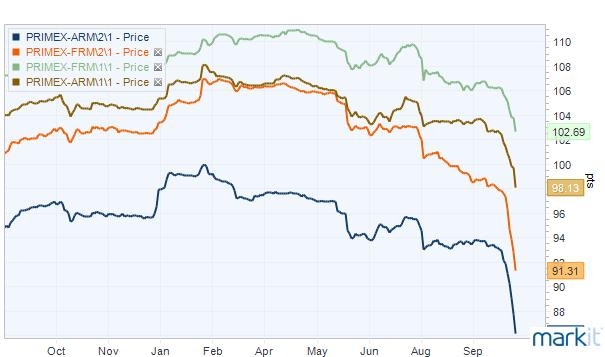U.S. Mortgage Crisis Goes Primetime
Housing-Market / Subprime Mortgage Risks Nov 01, 2011 - 09:22 AM GMTBy: Peter_Schiff
 John Downs writes: A near-death experience often provides needed perspective to effectuate real change. But no matter how often the over-regulated and over-subsidized US banking sector flirts with disaster, it never seems to change its ways.
John Downs writes: A near-death experience often provides needed perspective to effectuate real change. But no matter how often the over-regulated and over-subsidized US banking sector flirts with disaster, it never seems to change its ways.
Three years have gone by since subprime mortgage exposure threw the financial system into cardiac arrest. Experienced analysts are under no illusions about the progress since then: the banks are still not eating right and they're certainly not slimming down. It seems these institutions feel trapped by their situation and are just waiting for the inevitable. This month, the PrimeX group of indices, a measure that quantifies the likelihood of default in prime residential and commercial mortgages, began flashing red.
In 2007-8, I was working in the mortgage refinancing industry, and many of my associates began taking notice of the ABX index that tracked the performance of subprime loans. At that time, many of us reluctantly began to realize that soaring default rates would bring the subprime mortgage situation to an ugly end. When this happened, the ABX executed an historic nosedive that is now regarded as the opening act of the financial crisis. In just six months, many categories of subprime bonds lost more than two-thirds of their value.
Most of these shaky mortgages only existed in the first place because of government subsidies and incentives. In fact, in 2008, 66% of mortgages were government-sponsored. When the crises hit, the credit markets seized, Lehman Brothers collapsed, and Washington chose to step in with fiscal and monetary stimulus to prevent a systemic collapse.
Those trillions of bailout dollars were supposed to dispose of some portion of the "toxic assets" and buy enough time for the banks to get their houses in order. Coming from officials who were consistently wrong about the economy in the years leading up to the crisis, it's not clear why this logic was widely accepted. Unsurprisingly, the plan didn't work and the economy continues to ail. Now, just as we pass the three-year anniversary of the collapse of Lehman, PrimeX has started to crack.
PrimeX is divided into 4 indices: top-tier Fixed (FRM.1), top-tier Adjustable (ARM.1), second-tier Fixed (FRM.2), and second-tier Adjustable (ARM.2). As you can see in the following chart, all four metrics have recently continued on a downward slope. At the beginning of August, all metrics except ARM.2 were trading above par, meaning that investors were willing to pay more than the face value of the bond in order to receive the interest payments. Now it appears investors may be rethinking their assumptions. FRM.2 fell below par in late August, and this month, the first top-tier metric, ARM.1, followed suit. That leaves only the top-tier of fixed-rate mortgages above par.

Source: FT Alphaville. PrimeX.
Some analysts are dismissing these moves because the PrimeX indices are thinly traded. However, the recent downward move is well out of typical trading bands of these indices, and more extreme in percentage terms than any prior episode.
Those who defend the strength of prime mortgages admit delinquencies and defaults have steadily increased but they insist that they have not jumped in a way that would justify the sharp drop in the index. However, my experience in the markets has shown me that fundamentals can weaken progressively without initiating panic selling. It often requires a shock to move the market precipitously. In this case, Fitch's October 5th announcement that they had downgraded 42% of its latest sample of US prime mortgages might have been a trigger.
It is my opinion that the announcement from Fitch was merely a catch-up move after similarly dark assessments from Moody's and S&P. However, as with past crises, the what is often widely known; it's the when that surprises. For example, why did investors suddenly lose confidence in Bear Stearns whose exposure to subprime had been long noted?
There may not be any single fact that explains the when; investors just have to keep an ear to the street and trust themselves to interpret the early rumblings. That is why I'm confident that PrimeX is signaling that right now even the most highly considered portion of the mortgage market may be in jeopardy.
It's also worth noting that the rising delinquencies have occurred against a backdrop of rock-bottom interest rates. If anything, lower rates should be pushing delinquencies down. If interest rates were to rise substantially, which we believe is a strong possibility, mortgage stress may greatly increase.
At a time when banks and the federal government are still struggling under the weight of toxic sub-prime assets, I don't think we are in a position to deal with any more mortgage losses. Although our economic problems may look formidable now, if we see real stress emerge in the prime mortgage market, we may not have a leg left to stand on.
For full access to the remaining articles in The Euro Pacific Global Investor Newsletter, please click here to subscribe.
For an in-depth look at the prospects of international currencies, download Peter Schiff's and Axel Merk's Five Favorite Currencies for the Next Five Years.
Be sure to pick up a copy of Peter Schiff's hit economic fable, How an Economy Grows and Why It Crashes.
John Downs is Vice President and Investment Consultant with Euro Pacific Capital. Opinions expressed are those of the writer and may or may not reflect those held by Euro Pacific Capital, or its CEO, Peter Schiff.
© 2005-2022 http://www.MarketOracle.co.uk - The Market Oracle is a FREE Daily Financial Markets Analysis & Forecasting online publication.



